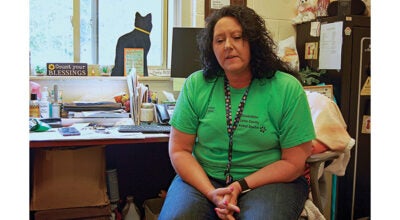County reappraisal, increased property values raise tax concerns for homeowners
Published 3:11 pm Tuesday, May 4, 2021

- File Photo Carter County Courthouse.
|
Getting your Trinity Audio player ready...
|
BY KEVIN GREEN
STAR CORRESPONDENT
kevin.green@thewritefacts.com
Some Carter County residents are upset about a recent hike in property appraisals and claim that the uptick in home values was not evenly applied across the board even though there is no data to support that claim.
While they are upset, they say they are not surprised. Tennessee state and local governments closed up many businesses and schools in response to the coronavirus, putting thousands out of work.
County officials do have to fill the budget shortfall and while they cannot look too hard at property taxes right now, the rise in property values may be part of their overall long-term solution, some property owners speculate.
A spokesperson at the Carter County Tax Assessor’s office said per state law, Carter County properties are reappraised every five years. The reappraisal reflects the increase in property values over that period. However, the employee pointed out that the new reappraisals do not reflect the recent uptick in property values. “If it did, the reappraised value would be much higher as there is a hot real estate market right now,” she said.
“That does not necessarily mean property taxes will be raised. State law forbids the county from receiving a windfall by raising taxes during a property reappraisal year. The tax rate will be lower this year to reflect the increased reappraisal value. In fact, the tax rate in Carter County has remained the same since the last reappraisal year,” said the spokesperson. The present tax rate is $2.47.
“Just because you get a higher property value on that piece of that paper you received in the mail doesn’t necessarily mean you are going to be paying more in taxes. State law says that when property values go up the tax rate has to drop to bring in about the same amount of money that the county brought in in the previous year. The only way that a county can exceed that rate is if the county commission votes to raise that property tax rate back above the lower certified tax rate so it’s important to understand that as well,” the spokesperson said.
However, your property tax could rise. For instance, say property values overall went up 20 percent since the last reassessment, the tax rate would drop about 20 percent or so. However, if your individual property went up 50 percent perhaps because of improvements or location, you could end up paying more in taxes than you would even with the new certified tax rate.
“The value of my home shot up another $50,000,” said Chris Little, homeowner and life-long county resident.
“No new homes built around me, no new services, schools or industry, class nine fire protection and they raise my home’s value,” said Little.
While many residents are upset about the value hike, they are also asking whether the property value increases were applied equally across the board.
Little said he was told by some of his neighbors that their property value even doubled. “Of course, they could be just saying that, but I know of one woman who said hers went more than the property is worth.”
Little believes that even though the county cannot raise taxes right now because of the certified tax rate, there are no such protections when they look to raise taxes in coming years when they need to meet a budget.
A handout from the Carter County Assessor of Tax Office explains the recent appraisal. “Reappraisal of property for tax purposes is required on a periodic basis to maintain appraisals at market value and to ensure equity of appraisals throughout the jurisdiction. Every county in Tennessee is on either a four, five, or six-year cycle of reappraisal.”
The upset homeowners have a larger issue even if the increase in their home value complies with state law and is protected by a certified tax rate and net neutralization.
The issue is these protections end after the year that appraisals were done, says Little.
The handout seems reassuring in its language that says property owners will pay an adjusted amount of tax regardless of the value of the property to “prevent local governments from experiencing a ‘windfall’ in reappraisal years at the expense of property owners.”
In smaller print, however, the release further seems to strip those protections with “[f]inal Actual Tax Rates used by each Governing Body may be adjusted to meet Final Budgetary Requirements as set per jurisdiction.”
“All they [county commissioners] have to do is convene and say they are not meeting their budget to raise taxes,” said Little. “I would rather pay that tax based off my home’s old appraised value. They could even lower taxes after that point and it would not help me.”
So far material released by county officials is silent on the attribution question. Little’s property values went up approximately 30%.
Little and other property owners unhappy with their appraisals can take their complaints to the Carter County Tax Equalization Board when it meets. Also, if you believe your house or property is unfairly over-assessed, the tax assessor’s office can provide you with a tax appeal form and inform you of the tax appeal process. If your appeal is accepted, your property valuation (and property taxes) will be adjusted accordingly.





